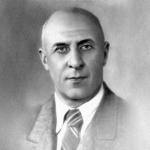
One of the key events of the anniversary International Piano Festival will be an evening of preludes and fugues by Vsevolod Zaderatsky on 23 December at the Concert Hall of the Mariinsky Theatre.
The cycle was written in 1937–1939 when the composer was in one of the USSR’s People’s Commissariat for Internal Affairs’ SEVVOSTOKLAG prison camps near Magadan. Having convinced the guards that he would only be writing music and no words, Zaderatsky was able to gain access to paper and pencils. The paper he was given was a pile of blank telegraph sheets.
The evening, which will introduce residents of St Petersburg to the composer’s music, will feature talented young pianists representing the Moscow piano school including Xenia Bashmet, Lukas Geniušas, Andrey Gugnin, Nikita Mndoyants, Yuri Favorin and Andrei Yaroshinsky. Most of them are appearing at the Concert Hall of the Mariinsky Theatre for the first time. The concert begins with an introduction by music historian Professor Vsevolod Zaderatsky Jr of the Moscow Conservatoire.
Vsevolod Petrovich Zaderatsky was born on 21 December 1891 in Rovno and graduated from the faculty of law of the Moscow University and from the Moscow Conservatoire as a pianist, composer and conductor. He studied under Sergei Taneyev and Mikhail Ippolitov-Ivanov. In 1915–1916 he was one of the music teachers of Tsesarevich Alexei, heir to the Russian throne, from 1916–1918 he was an officer in the imperial army and took part in World War I and from 1918–1920 he was an officer in the White Voluntary Army of General Denikin. In 1920 Zaderatsky was captured, which meant the loss of many rights including the right to publish his compositions, perform his music and generally to be involved in any public activity whatsoever. His final arrest in Ryazan in 1926 coincided with the destruction of everything he had ever written and today we have the composer’s manuscripts starting from 1928.
Vsevolod Zaderatsky composed six piano sonatas, a cycle of twenty-four preludes and fugues, three programme piano cycles, two operas and symphony and ensemble scores.